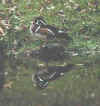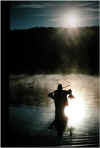| 10-03-05
Hoosier hunters may be inconvenienced when seasons on waterfowl start
popping later this month and in November at the Monroe Reservoir Stillwater
Marsh complex, but Rex Watters, fish and wildlife biologist at the 10,800-acre
impoundment, says there will be a lot of hunting opportunity there.
Monroe’s Stillwater Marsh waterfowl hunting complex, is one of the state’s
most productive and colorful public hunting areas.
The potential cutback on waterfowl hunting opportunity stems from the
fact that the Monroe County Highway Department will be doing some repair
work on the causeway that crosses Sugar Creek Bay. This is on Point Road.
The Army Corps of Engineers, operator of the reservoir, reported the
reservoir stage at 535.8 feet (above sea level) last Sunday. That is 2.2
feet below Norman summer/winter stage of 538.
Plans call for dropping Monroe three feet below normal pool level, possibly
as much as five feet if necessary. This could bring low water levels during
the three-day waterfowl season later this month, and possibly into the
November/December/January season.
At this point, the waterfowl-hunting situation at Monroe is a “play-it-by-ear”
thing. But to prepare for the possibility of low-water levels when wild
wings beat southward (and hopefully spend some time in Hoosierland), Watters
says the smaller marshes have already been plugged to hold any runoff from
rain that the weather offers.
He says Upper and Lower Quail Fields, Blue Goose, and Friendship are
holding water now.
Drains at Stillwater Marsh have not yet been closed because crops remain
in the fields, and that translates into a “doubtful” designation, at least
for the October gunning. Hickory Woods and the Oxbow areas should have
water, Watters says.
Applications for the five days of reserved hunting during the late season
on waterfowl (Nov. 25 through Jan. 20 in the South Zone) were due Sept.
30. Thus, it is too late to apply for reservations.
But Watters points out that even though the first 10 picks on reserved-hunting
days will go to those who have reservations, there still will be 10 to
12 hunting areas available even on reserved days.
Monroe has a calendar available to help potential hunters decide when
they should make the trip to Monroe with waterfowling in mind. It is available
by calling the Monroe Reservoir office (812-837-9546, not a toll-free call).
Watters suggests that those planning hunts at Monroe this year should
call the Monroe office before they go to hunt.
THE MIGRATION
The third-week report of the Division of Fish and Wildlife’s weekly
waterfowl survey counted only about 3,000 ducks on the 20 public-land survey
sites with mallards and wood ducks counting for roughly two-thirds of the
birds here now.
North Zone areas (roughly the northern third of the state) reported
3400 woodies, 426 mallards and a smattering of other species, including
blue and green-wing teal.
But the big push in the migration is yet to come, and the vanguard of
flight birds is made up of woodies that will augment our own native woodies.
The DFW survey is conducted each Wednesday through the migration of
waterfowl. It is not intended as a head count of waterfowl in the state,
but rather as an indicator of the progress of the fall migration.
Click
on thumbnail image for enlarged view.
| The
wood duck is one of Indiana’s most beautiful birds, as this male reflects. |

|

|
Monroe’s
Hickory Woods is the scene as this hunter places decoys to meet the first
rays of a fall sun. |
|

